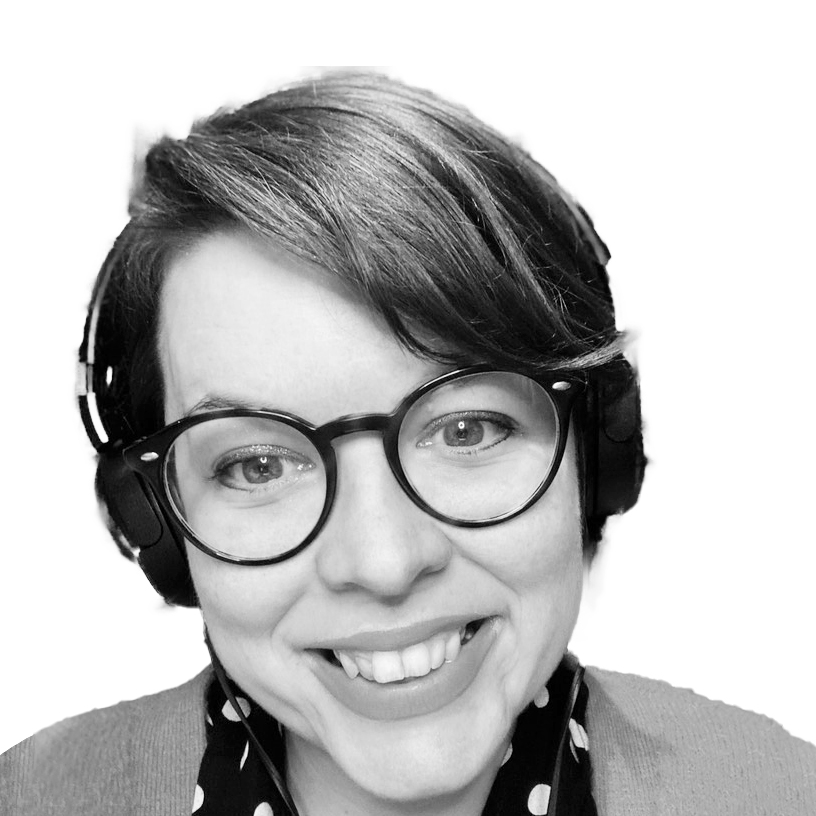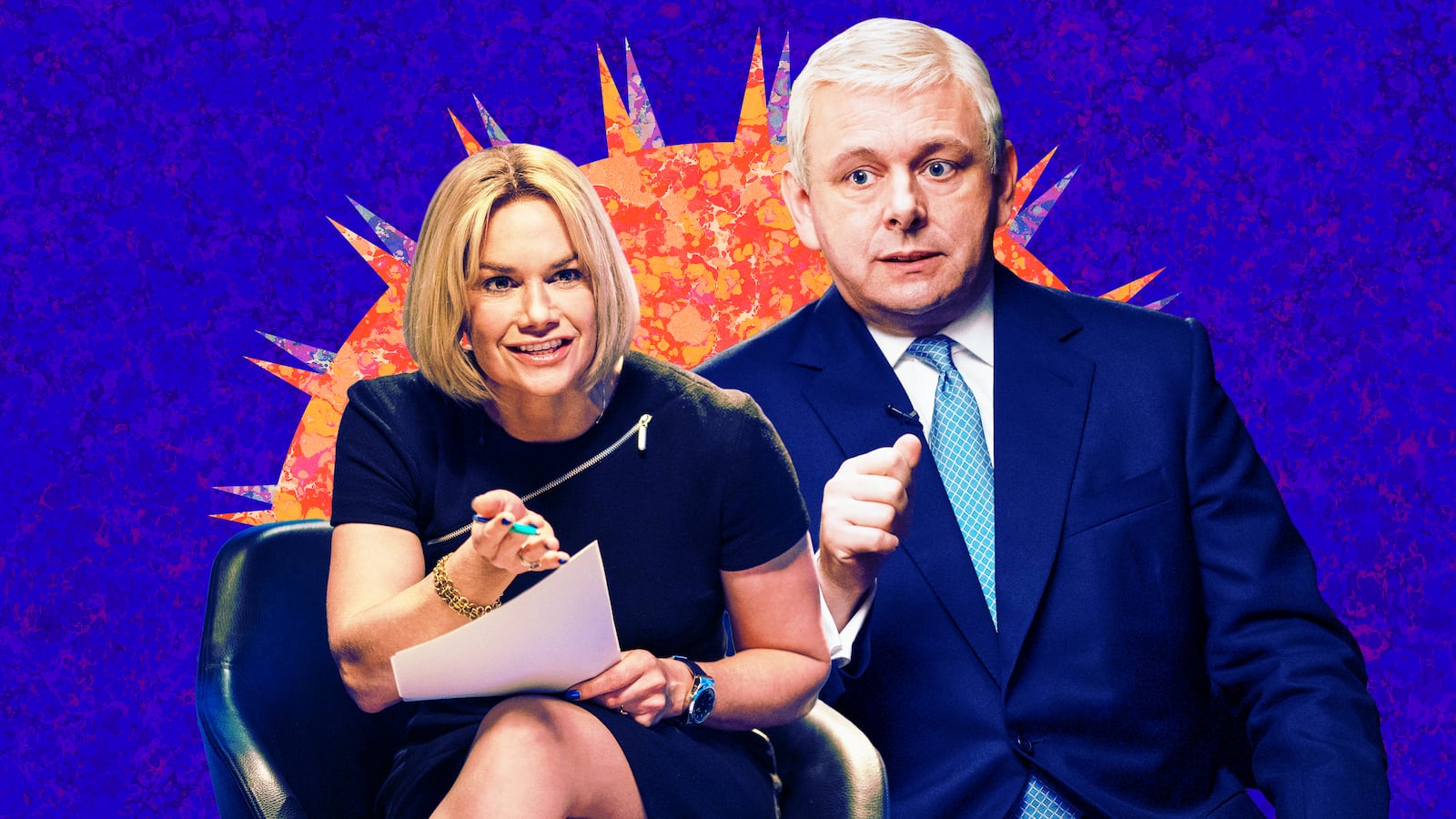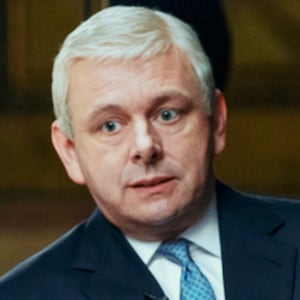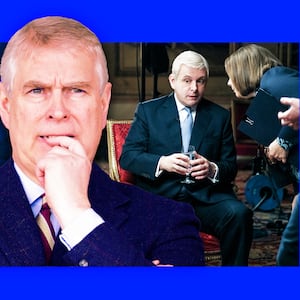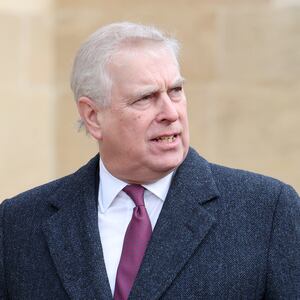If you were to drink a shot every time Prince Andrew, Duke of York (Michael Sheen), mentions he fought in the Falklands War in A Very Royal Scandal, you would be on your way to getting wasted by the end of the three-part limited series.
How Prince Andrew responds in the Prime Video drama to his connection to convicted sex offender Jeffrey Epstein and accusations made by Virginia Giuffre is informed by how he believes he should be treated as a member of the British royal family with military experience. “I don’t need your permission to do an interview, thank you very much. I fought in the f---ing Falklands,” Andrew yells in the first episode after his press secretary is vehemently against talking to the press. (“I am the second f---ing son of the f---ing sovereign” is his very Kendall Roy argument seconds before.)
Portraying events leading up to, during, and after the instantly infamous interview with Emily Maitlis on the BBC’s Newsnight in November 2019, the anthology series from the producers of A Very English Scandal and A Very British Scandal takes us behind closed doors with both Andrew and Emily Maitlis. While this isn’t the first adaptation of this seismic televised conversation (Netflix’s Scoop beat the series to the punch), it does boast Maitlis as an executive producer, and gave actress Ruth Wilson access to the woman she is portraying.
Over Zoom, Wilson and Sheen tell The Daily Beast’s Obsessed about their approach to peeling back the layers of a story that still has the power to surprise.

Ruth Wilson and Michael Sheen.
Christopher Raphael/Blueprint/Sony Pictures TelevisionYou will not be shocked to learn that Sheen did not have similar access to the man he is depicting, but he did look at archival footage of the 1982 conflict Andrew wears as a badge of honor. That time was a far cry from the present-day reality in which he faces sexual assault allegations and a reputation of disgrace.
“The thing that encapsulated for me is that footage of him coming back from the Falklands, where he’s in uniform, he comes off the ship onto the dockside,” says Sheen. “There are thousands and thousands of people cheering and shouting; he’s got a rose in his mouth; he looks gorgeous. He’s every inch the fairytale prince, and he was absolute tabloid fodder—everyone thought he was amazing.”
While The Crown didn’t show much of Prince Andrew’s trajectory beyond some superficial moments that emphasize that he was Queen Elizabeth’s favorite child, over the three episodes Sheen taps into every insecurity and unflappable need for recognition as someone no longer of interest or cultural relevance.
“For a man who, on the outside, appears to have everything, the experience—my version of him, anyway—of being a man whose own inner experiences are being denied things, are being restricted, are being kept out and not given what he feels he should have,” Sheen says. “That changed my perception of him in terms of making certain choices.” (Sheen makes it clear that he is not “justifying or excusing” these choices.)
Sheen has been candid about the British royal family in the past (including returning his OBE in 2020, so he could be critical without appearing hypocritical), so you might expect some spicy takes. Instead, his shock over how this interview ever made it onto the air—“When I first watched the interview, like everyone else, I think a big part of it was, ‘How on earth did this happen?”—is guided by the script and understanding “how those extraordinary set of circumstances could come to be together to create the interview.”

Claire Rushbrook and Michael Sheen.
Christopher Raphael/Blueprint/Sony Pictures TelevisionThe series’ non-linear approach to the interview timeline provides insight into Prince Andrew’s decision-making. It also underscores why Emily—criticized and celebrated for an errant eye roll months earlier— is determined to score an interview with the accused prince. “What we wanted to deal with in this show is a woman in a very male world having to constantly prove herself under extra scrutiny because she's a public figure and a woman, and how that might affect you or drive you to want more or to prove yourself,” says Wilson.
Landing the sit-down was only part of the battle, as the team negotiated a full hour rather than 15 minutes. Comments about an inability to sweat and the Pizza Express in Woking alibi were instantly memeable, but seeing everything leading to those humdingers is fascinating. Wilson is acutely aware of Maitlis’ responsibility and the pressure of being granted this access. “She’s the one woman who has got this opportunity to ask this man of privilege and power about his relationship with Epstein and about the possible relationship with Virginia Giuffre, and she asked all those,” says Wilson. “I mean, she’s extraordinary. That interview is a masterclass.”
Maitlis had to consider her safety and how she would be perceived in the wake of her groundbreaking sit-down with the duke. “Getting underneath not only how it occurred but the consequences and her own personal experiences—having a stalker and being a public figure—only that this [interview] would draw more attention,” says Wilson. “She doesn’t want to be a victim. She never places herself as a victim, but yet has to deal with that every day.”
While preparing for the role, Wilson had the daunting task of interviewing the “massively involved” Maitlis, who was on hand to discuss this pivotal moment in British royal family coverage, and whether anything has changed as a result. “She’s made to question her own role as a journalist and what news is these days. And actually, does journalism have this ability to hold power to account anymore?” says Wilson. It is this question and this notion that a female journalist “is there representing the voice of those women that can’t speak for themselves” that propels the latter part of A Very Royal Scandal.
Wilson is a self-confessed “big news junkie.” Meeting the informal version of a woman she has watched for years on Newsnight added to the layered portrayal (“She eats Percy Pigs [candy] and Wine Gums, coffee and vodka.”). It might seem like a superficial topic, but the contents of Maitlis’ bag are revelatory: “She’d tell me what’s inside her handbag, which was an eye mask, a passport, some sleeping pills—in case a story breaks, and she’s got to get out there.”
In fact, Maitlis gave Wilson her handbag to use in the series for that additional authenticity. Details like ink stains on the lining of this bag and pen ink over her trousers were insightful in how Wilson leans into the “ultimate professional” side of Maitlis, but also the in-between unpolished moments. “When it really mattered, and she’s being watched and observed, and in that position, she has that responsibility, she takes it incredibly seriously, she’s focused, and she does not drop the ball,” says Wilson. “But when she’s in her everyday life or the build-up to it, all the stress is there; you see the stress, the chaos, the adrenaline of being a journalist, of getting a story.”
Sheen also has the daunting task of marrying the public and private of the famous person he is playing. In this case, the British royal family is “such a defended and guarded institution,” Sheen says. Piecing it all together is like “a hall of mirrors,” as there are known facts, such as Andrew and Sarah “Fergie” Ferguson (Claire Rushbrook) living together with their daughters after they were divorced. “In terms of the home life, it is extraordinary, and that relationship having been, it seems, allegedly told that he had to divorce her by members higher up in the firm, to then continue living together in that way,” says Sheen.
Fergie’s financial woes are public record, “but what was actually going on there behind closed doors is so difficult to get at—sifting through fact from fiction,” he says. Anyone who has seen Scoop or the fake version of The Crown in Girls5eva will know all about Andrew’s stuffed toy collection, but Sheen has been told contradicting stories: “There are people I’ve spoken to and heard from who say ‘Yes, that is the case.’ Other people say, ‘No, that’s nonsense.” The same applies to how much Andrew shouts and swears at people. “It’s really hard to put together what is the actual picture. So obviously, there was a lot of guesswork there, and ultimately, you’re trying to serve the story that has been written,” Sheen says.

A scene from “A Very Royal Scandal.”
Christopher Raphael/Blueprint/Sony Pictures TelevisionUnlike The Crown, this series includes a disclaimer at the start: “Some scenes have been fictionalized for dramatic purposes.” For Sheen, it is the rounded and complex version of events he was compelled by. “I felt it was worth saying yes to and taking the risk of going, ‘Well, we don't know whether this is true or not, or represented or not, but it feels it’s being done in a responsible way.’ So you do have to take a bit of a swing with that.”
While much is open to interpretation, Sheen does draw a line between what he considers to be two defining moments that took place in public. “The two biggest clashes with reality for him—the breaking through of the royal bubble and actually experiencing the reality of the real world—were the Falklands and the interview with Emily Maitlis. That’s where the bubble burst; one is a high point for him, and one is a low point for him.”
No matter how much Prince Andrew mentions the former, undoubtedly, the latter is more memorable. After all, only one of these experiences has been adapted (twice!).
